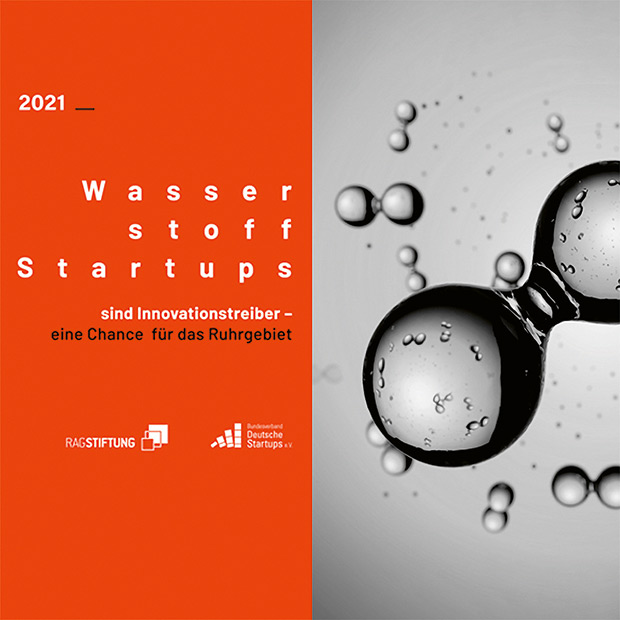In order to achieve the climate objectives by 2045, an enormous transformation is required in our production and business processes – particularly in industry. As a centre of industry at the heart of Europe, the Ruhr area is taking a leading role on the continent when it comes to the development and use of low-emission hydrogen solutions. The hydrogen report recently produced (Figure 1) shows how the ecosystem is driving innovation through initiatives within the established economy, a strong research landscape and, crucially, the many new start-ups coming onto the scene. H2 start-ups are bringing the dynamism required to the hydrogen market ramp-up, with the Ruhr area and North Rhine-Westphalia leading the way here in Germany, though the potential has by no means been fully exploited just yet.

Fig. 1. The hydrogen report produced by RAG-Stiftung and the German Startup Association shows how the ecosystem is driving innovation through initiatives within the established economy, a strong research landscape and, crucially, the many new start-ups coming onto the scene.Source: RAG-Stiftung
The key results of the study:
- Ecological transformation forms the basis: H2will play a fundamental role in the energy transition over the coming decades – the 24-fold increase in annually installed electrolysis capacity worldwide between 2014 and 2019 is already evidence of the sector’s enormous market volume.
- Research is picking up around the globe: H2research is gaining pace, as demonstrated by the significant increase in patents in the field of electrolysis. However, Germany and Europe are at risk of falling behind as this research is not being implemented in practice fast enough.
- More start-up investments in H2: The growing investments being made in the H2sector are further evidence of how attractive this sector is. Investments in European start-ups grew from 6 to 69 M € between 2015 and 2020, while the USA is already seeing investments in the hundreds of millions.
- The Ruhr area is a leading H2start-up hub: Start-ups are an important vehicle for accelerating the development of the hydrogen economy. North Rhine-Westphalia and Bavaria are home to over half of these young companies – with the Ruhr area and the Munich metropolitan area each fostering a sizeable 18 %. In order to adopt a leading role globally in the market ramp-up of H2, the ecosystem in Germany and in the Ruhr area needs to be bolstered. Three key recommendations can be made based on the report in this respect:
- H2research in the Ruhr area should be application-oriented and even broader. To this end, the resources of existing facilities must be assessed and any potential for expansion – particularly in terms of links to practical and cooperation projects – identified.
- In order to boost the number of H2start-ups, a central, inter-university point of contact is required for anyone interested in starting a business in this sector – similar institutions in other technology fields can be used as a model here.
- In order to accelerate market developments, strategic partnerships should be forged: To do this, appropriate formats for cooperation between start-ups and the established economy need to be strengthened – experimental opportunities are required that minimise time and costs for both sides.
Bernd Tönjes, Chairman of the Board of Management at RAG-Stiftung, Essen, says: “In the Ruhr area, we have an established industry, leading research institutions and strong infrastructure – ideal conditions for the hydrogen market ramp-up. Not only that, we also have innovative start-ups that are bringing the dynamism required to the region. To be successful internationally, we need to bundle these strengths and work more closely together, as hydrogen requires teamwork. That’s why we are delighted to be involved in efforts to improve networking in the region by taking part in initiatives such as Essen’s H2 Advisory Board.”
Franziska Teubert, Managing Director of the German Startup Association, Berlin, adds: “Hydrogen has for a long time been viewed as an issue solely for the big players, but the growing number of small businesses being established in the H2 sector demonstrates how much potential start-ups have to offer as well. They are essential drivers of innovation, adding dynamism to the market ramp-up and bridging the gap between theory and practice. To make even better use of these opportunities, we need to further improve the application of research and the cooperation between start-ups and established businesses.”
The “Hydrogen startups. Accelerators of innovation: an opportunity for the Ruhr area” study follows on from the “Ruhr innovation report” also published by RAG-Stiftung and the German Startup Association, which identifies the strengths and challenges of Germany’s largest metropolitan area as a centre of innovation. The latest study on hydrogen demonstrates the importance of research sites in the region and the dynamism of political and industrial initiatives, which are instrumental in driving forward the development of the hydrogen economy. Above all, it demonstrates just how vital start-ups can be as a means of quickly and fully exploiting existing potential. (RAG-Stiftung/Si.)


